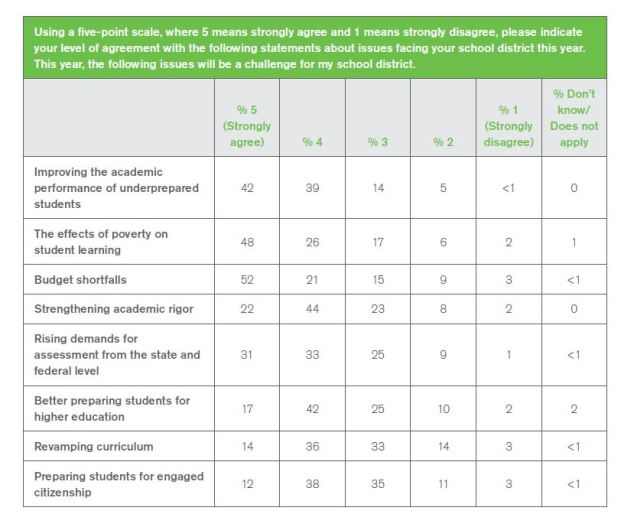From The Gallup 2017 Survey of K-12 School District Superintendents. Link: http://news.gallup.com/reports/217103/gallup-k-12-superintendent-report-201708.aspx#aspnetForm
Executive Summary
Gallup developed this research study of K-12 superintendents of public school districts in the U.S. to understand their opinions on important topics and policy issues facing education. Since 2013, Gallup has conducted the survey at least annually. The following are key findings from the 2017 study.
Forty-two percent of superintendents are engaged in their job, a significantly higher percentage than Gallup finds among U.S. workers nationally and on par with the 45% of workplace “leaders” (those who manage teams of managers). Engaged workers tend to be more productive, and their work leads to better outcomes for their organizations.
Superintendents in city, suburban and larger districts tend to show higher levels of work engagement.
Superintendents are most likely to believe their greatest challenges are improving the academic performance of underprepared students, the effects of poverty on student learning and budget shortfalls. Compared with 2013, far fewer regard rising demands for assessment from the state and federal level and revamping curriculum as challenges. Superintendents were most likely to name rising assessment demands as a challenge in 2013, but now it is a mid-range concern for them.
Superintendents express concern about being able to find talented teachers and principals to fill their district’s positions. Two-thirds say the quantity of new teacher candidates is decreasing, while fewer than one in 10 say it is increasing.
Superintendents are also much more likely to view the quantity of new principal candidates as decreasing (43%) rather than increasing (10%). Superintendents are somewhat less pessimistic that the quality of teacher and principal candidates is getting worse, but still more say it is decreasing rather than increasing. About one in four superintendents say that former teachers in their district are leaving the teaching profession entirely.
Not surprisingly, then, superintendents tend to rate their district as less effective at recruiting talented teachers and principals than they are at selecting, developing and retaining them.
Superintendents are generally positive about their relations with the school board. The vast majority indicate they agree with their board on most decisions, and two-thirds are confident their district is well-governed at the board level. But not all superintendents have a good working relationship with their school board — about one in five say they have considered leaving their position because of their relationship with the school board.
Superintendents are less likely today than a few years ago to positively evaluate their board’s knowledge of K-12 education or the board’s diversity and inclusivity. Forty-three percent strongly agree or agree their board is very knowledgeable about K-12 education, down from 55% in 2013. And 45% today, down from 52% in 2013, believe their
district has a diverse and inclusive board.
Superintendents are much more likely to be engaged with their work if they strongly believe their district is very effective in recruiting teacher and principal talent and if they are very positive about their relations with the school board and about their board members’ knowledge of K-12 education. Among various strategies or initiatives designed to foster student success after graduation, superintendents are most likely to rate having teachers who create excitement for the future as extremely important to achieving that end. Most also see building student engagement and teaching a rigorous academic core as extremely important to students being successful later in life.
Superintendents are largely confident that their graduates are prepared to be good citizens, to lead healthy lives and to make informed decisions about postsecondary education. They are less confident that students are prepared to manage their finances well and to understand how their talents align with the needs of the community. Superintendents are about equally likely to say their graduates will stay in the area and contribute to the local community as to say their graduates will migrate to other communities. Relatively few superintendents believe their students are prepared to be entrepreneurs and business builders in their communities.
Like many education leaders, superintendents believe early childhood care and education can have a substantial impact on student learning outcomes once they begin school. But they perceive early childhood education programs to be lacking in their state, and a majority disagree that most children are prepared to be successful when they
start kindergarten.
Superintendents acknowledge that federal education policy affects their district, but they remain negative about the job the federal government has done in this area in the last five years. It is unlikely that those views will change under the new Donald Trump administration, since a majority of superintendents say they have no confidence at all in the Trump administration to handle K-12 education policy.
Reflecting that pessimism, 32% of superintendents strongly agree or agree they are excited about the future of K-12 education in the U.S., down from 44% in 2015. The vast majority of superintendents remain excited about the future of their own district.


Gallup surveys are nothing but bunk that’s paid for by the people wishing to push a political agenda….and education is a very big, money infused agenda. Data can be skewed and questions can be worded accordingly. Don’t believe anything you read out of Gallup.